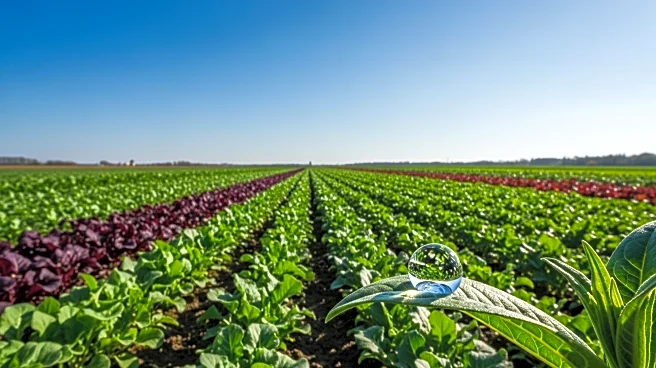What is the story about?
What's Happening?
PepsiCo has announced a significant investment of $216 million to promote regenerative farming practices across the United States. This initiative includes a long-term partnership with Practical Farmers of Iowa (PFI) and other farmer organizations. The investment aims to provide farmers with tools, resources, and programs to enhance soil health, reduce emissions, and secure a resilient future for farming. Wendy Johnson, a farmer in Iowa, exemplifies this movement by transforming her family farm into a regenerative agriculture operation. Her farm, Jóia Food & Fiber Farm, focuses on biodiversity and sustainable practices, such as reduced tillage and crop rotation. PepsiCo's partnership with PFI supports farmers like Wendy in adopting practices that restore land and strengthen their businesses.
Why It's Important?
The investment by PepsiCo is crucial for advancing sustainable agriculture in the U.S., which is vital for food security and environmental health. Regenerative agriculture practices help improve soil health, reduce carbon emissions, and increase biodiversity, which are essential for combating climate change and ensuring long-term agricultural productivity. By supporting farmers in adopting these practices, PepsiCo is contributing to a more sustainable food system. This initiative also aligns with PepsiCo's goal to implement regenerative practices across 10 million acres by 2030, highlighting the company's commitment to environmental stewardship and sustainable growth.
What's Next?
PepsiCo's investment is expected to catalyze further adoption of regenerative agriculture practices among U.S. farmers. As more farmers receive support and resources, the movement towards sustainable farming is likely to gain momentum. This could lead to increased collaboration between corporations and agricultural communities, fostering innovation and resilience in the farming sector. Additionally, the success of this initiative may encourage other companies to invest in similar sustainable practices, amplifying the impact on the environment and food systems.
Beyond the Headlines
The shift towards regenerative agriculture has broader implications for rural communities and the agricultural industry. It promotes a holistic approach to farming that integrates environmental, economic, and social dimensions. By prioritizing soil health and biodiversity, regenerative practices can enhance the resilience of farms against climate-related challenges, such as droughts and floods. Moreover, this approach supports the diversification of farm income streams, contributing to the economic stability of farming communities. The collaboration between PepsiCo and farmer organizations also underscores the importance of partnerships in driving systemic change in agriculture.
















